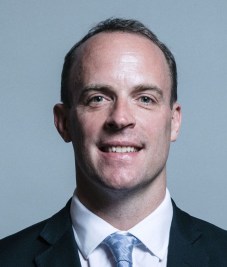Yesterday the newly-minted Secretary of State for Exiting the European Union, Dominic Raab, appeared before the Brexit select committee. I suspect that he didn’t expect to be demoted two weeks into the job, but almost simultaneously, that was what happened, as Theresa May – the Prime Minister who has shown such impeccable judgement and negotiating skill with her own party – takes on the mantle of lead negotiator.
Bearing in mind that Raab’s predecessor, David Davis, spent just four hours with Michel Barnier (the EU’s lead negotiator) this year, I suspect this is more of a cosmetic update than a meaningful power shift.
Raab was keen to reassure the select committee about something quite important to all of us: the government’s preparations for food shortages in the event of a no-deal Brexit. As recently as Sunday, he had failed to deny that the government was stockpiling food, calling it only a ‘selective snippet’.
Today, he clarified that it wasn’t the government doing the stockpiling. Instead, the government is working with industry to do the stockpiling. It’s a neat distinction, but not one I personally find reassuring.
He adopted another unnerving phrase in the course of this explanation: that there will be ‘adequate food supplies’.
Plenty of other people have pointed out the unattractive nature of this statement. I think I’ve seen at least three separate mock-ups for putting it on the side of the famous Vote Leave bus.
But there’s something more significantly wrong with Raab’s claim – not just wrong, but disturbing. Anyone who follows the issue of food in the UK will know that there is already a crisis. Food poverty has been on the rise in our country, most notably since the recession a decade ago.
It’s very difficult to find good statistics on this, because – guess what – the government doesn’t collect data. They claim, for example, that monitoring the number of people using food banks would place too much of a burden on the volunteers who run them. (Seriously.)
So it’s left to the civil society organisations – mostly cash-strapped charities – to do the role of our civil service. And they do a decent job. In particular, the Trussell Trust produces tons of research and advocacy. Importantly, they also adopt a cross-cutting approach, looking for instance at the impact of Universal Credit and benefit cuts on food bank users. Oxfam and the Child Poverty Action Group are also notable for their work on this issue.
Some key statistics:
- According to UN data from 2014, more than 2 million UK citizens are in severe food poverty and up to 8 million live in households where there is moderate or severe food poverty [src]
- The Trussell Trust doled out 1.3 million 3-day emergency food supplies in 2017/18 – 13% higher than the previous year (and they only represent 2/3 of the UK’s food banks) [src]
- 1 in 4 parents are skipping meals because they can’t afford them [src]
I confess to being skeptical of some of this research. Some of these organisations are clearly on low budgets and probably do not have the kind of resources that are required to do really high quality research of this type.
That’s yet another reason why a government serious about providing ‘adequate food’ for its citizens would already be measuring food poverty and food insecurity. Emma Lewell Buck, the Labour MP, has attempted to introduce legislation to that end on several occasions, without success.
In a cruel irony, her most recent Bill, still going nowhere in Parliament, even uses that same phrase:
For the purposes of this Act “food insecurity” means a person’s state in which consistent access to adequate food is limited by a lack of money and other resources at times during the year. [emphasis added]
When the government won’t even get the information it needs to figure out how to help people who are already living below the breadline, there is no reason to trust Dominic Raab’s inadequate reassurances.
EDIT: I’m grateful to Andy Jolly for drawing my attention to the Food Standards Agency’s ‘Food and You’ survey. The FSA’s remit is much more to look at food safety and hygiene, but there is data in this survey that counts as official statistics. It is still inadequate so far as meeting the needs of citizens goes, but it’s more detailed than I thought, so consider this a partial correction.
You can find the ‘Food and You’ surveys here. Key statistics from the last one (April 2018):
- 9% of UK households are food insecure
- 18% of those aged 25 to 34 live in food insecure households (compared to 2-3% of those aged 65 or over)
- Women are more than twice as likely to experience food insecurity than men
- 41% of respondents aged 16-24 said they sometimes or often worried that food would run out before they had money to buy more, compared to 5-7% of those aged 65 or over
